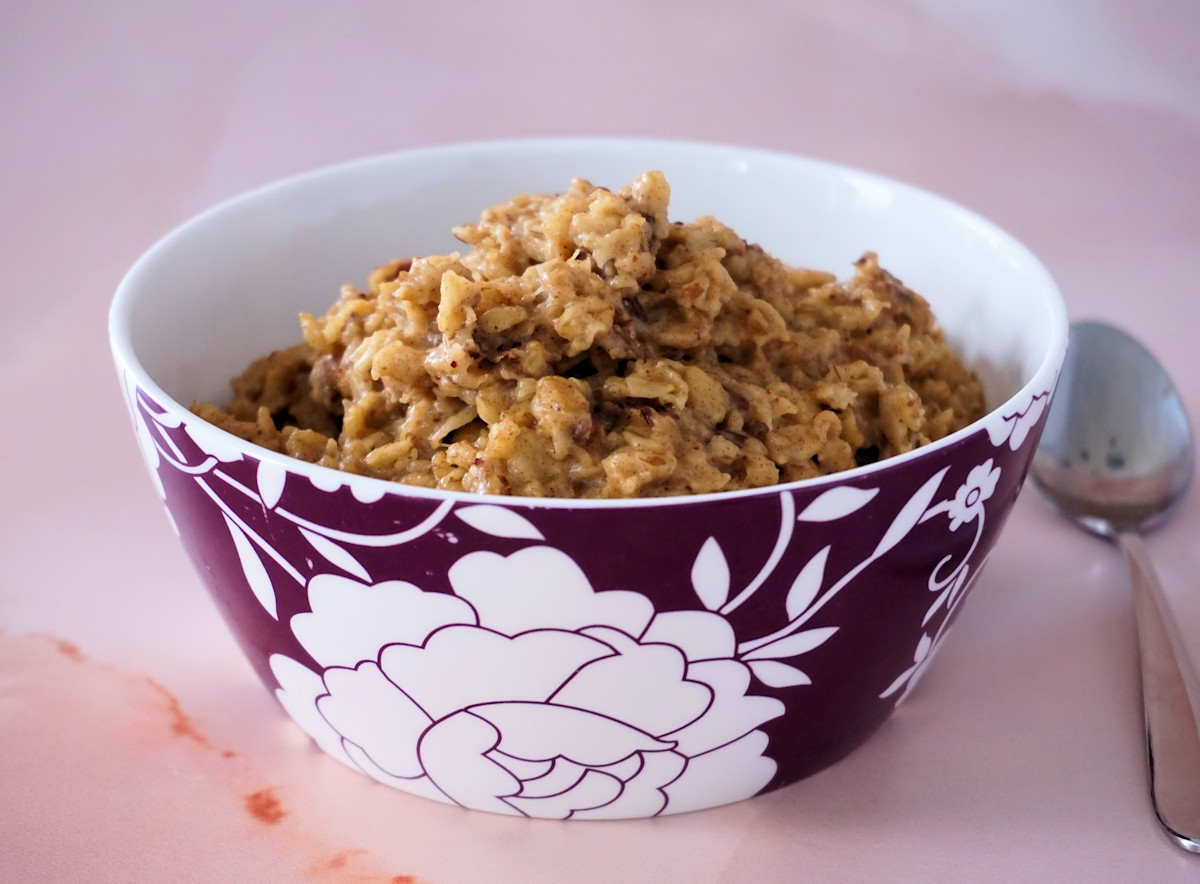Chunky porridge naturally sweetened with chopped dates needs no additional sweetener. And it’s the perfect kick-starter for the day.

Porridge means oats – right?
If your idea of perfect porridge is runny, gloopy goo, look away now. In my books (and it should be in yours too since the chunkier, the better for your gut), porridge should be thick enough to eat with a knife and fork.
That’s a joke – but I do not care for soup in the morning. Jumbo oats are my favourite cereal and I like to see them retain their shape in my breakfast.
But oats are not the only cereal, certainly. In fact you might be amazed at the multitude of grains and seeds that can make good porridge.
Millet, semolina, rice flakes, barley flakes and wheat flakes are all wonderful in their own specific ways.
Millet is a little harsh and ever so slightly bitter but it cooks into lovely tiny pearls, fabulous with honey.
Semolina is disdained as baby food, so unfairly it brings tears into my eyes. It is possibly the tastiest of cereals and it has the comforting familiarity close to rice porridge that takes you back to your childhood – in a good way.
Rice, barley and wheat are all quite similar to oats, with wheat probably the coarsest and rice the stickiest, naturally. I like a mix of all those, with oats as well, for both porridge and for my homemade granola or muesli.
Milk or water?
I’ll be harsh and direct: for the skinniest breakfast it would have to be oats cooked on water, no sugar, no salt. But there’s no enjoyment in that!
With health aspects in mind, it’s supremely good to eat porridge since it helps lower bad cholesterol, the civilisational excess common even in the healthiest of us. If you cook porridge with milk, bone health is aided, thanks to the calcium from the milk.
And the fuller fat milk the better – as milk fat actually helps raise the good cholesterol levels.
No sugar in my porridge
My blissful childhood memories are of a semolina or rice porridge, glistening with puddles of melting butter and covered with a crust of sugar. That was how I loved it.
But my adult porridging is equally delightful these days, albeit not swimming in butter and sugar.
When I’m in need of extra indulgence, I add a small fistful of raisins or cranberries into the porridge while it cooks and top it with a sizeable dollop of crème fraiche in my bowl. That porridge incarnation is beyond delightful.
Other days I cook plain porridge, with no additions. But in each case, I sweeten it rather lavishly with honey or maple syrup.
Naturally sweetened porridge
Maple syrup and honey both sound natural and healthy but unfortunately, they are each a form of sugar. Being less or even minimally processed makes them a little less disastrous for weight watching and for raising blood sugar levels but health foods they ain’t.
Dates, on the other hand, are very much so.
Dates are dainty little bombs of sweet goodness, rich in minerals, some vitamins and laden with fibre.
If, being fruit and dried to boot, they weren’t rather calorific, they’d be the absolutely perfect snack. And the best news is that they sweeten porridge (and your morning with it) so efficiently, you don’t need to reach for extra honey.
How to prepare date porridge?
My porridge-making method is exactly the same no matter what I prepare it with.
An amount of cereal in a small milk pan, about 50g, is covered with 150ml of full fat milk (or semi-skimmed, if you must) and a large pinch of salt. That’s the proportion per person to be doubled or tripled as needed.
In the case of date porridge, I add three or four finely chopped dates and leave the lot in the fridge overnight.
In the morning I bring it to the boil and cook, stirring once or twice, for five to ten minutes until my porridge is thick and the dates have all but dissolved. And tuck in with glee instead of sugar.
What dates to pick for cooking?
The choicest, fanciest, fattest and juiciest dates are Medjool, and naturally they are also the most expensive.
In cooking their softness and fleshiness would not be appreciated so I’d go for cheaper, Deglet Nour or Halawi dates. No name dates are fine too, as long as they are free flow – not pressed together into a brick.
By all means buy some Medjool or (even pricier) Awja but savour and snack on them instead of putting them in your porridge.
More breakfast recipes
Plum crumble breakfast bars, cinnamon flavoured, reduced in sugar content, are just the thing for those whose sweet tooth is awake at breakfast time.
Overnight oats with yoghurt and fresh fruit are the simplest breakfast to prepare ahead and will benefit from being soaked in homemade yoghurt.
Homemade granola with olive oil and maple syrup, with seeds, nuts and dried apricots. It’s toasted in the oven till golden, crisp and irresistible.
More date recipes
Tamarind paste added to a date cake gives it a wonderful tang. This tamarind date cake with cardamom icing comes from Dan Lepard and it's simply wonderful.
Date shortbread bars, shortcrust slices sandwiched with date, cinnamon and orange filling. Good shortcrust pastry with naturally sweet filling is great for a treat.
Dates are not just for Christmas: featured here in a wonderful dessert that must be cut into small squares or bars - it is divinely rich.